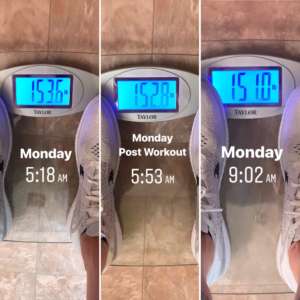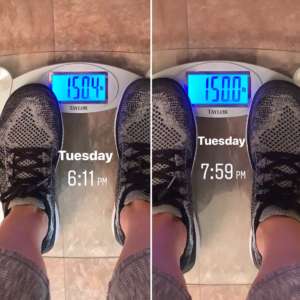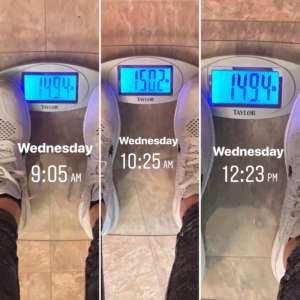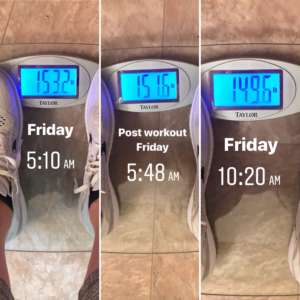If you have had any type of discussion with me regarding weight loss and success in a fitness program, you know how I feel about using the scale (solely) as a determinant to track progress. When discussing fitness goals with clients (and anyone around me really) the most common thing I hear is “I want to just lose 10 more pounds” or “I want to get back to my pre-baby weight of (enter crazy drastic number here” etc. etc. I completely understand having goals and wanting to see a certain number on the scale, but the problem I have is when this is the only way someone tracks their progress. What about measurements? What about energy levels and quality of life? What about strength? Posture? Sleep? Increased body confidence? and so much more that comes along with participating in a consistent long-term fitness regimen?
The Beef I Have With The Scale
Yes, it’s Ok to know your weight on the scale and check-in every once and a while to see what the number is looking like. By once and a while I mean once every 2 weeks, or even better once a month when you are on a fat loss mission and try not to get stuck on a certain “dream weight” as apposed to a “dream body”. I agree it is very gratifying to get on the scale in the morning and see a number smaller than the number that appeared last time you stepped on it; however, weighing yourself too regularly could be a recipe for destruction, especially if you are working out and strength training regularly. If you are strength training the goal is usually to increase muscular strength, but also to build more muscle leading to a more lean/toned appearance. Now muscle weighs more than fat, is more condensed, and takes up less room than fat. If you compare the size of 1 pound of fat to 1 pound of muscle it would be shocking, as the pound of fat is almost double the size of a pound of muscle. So it’s possible that you could be actually making amazing progress with your program, but you might see the number on the scale go up a couple pounds initially (What??!!!). It’s ok though, because if your clothes are fitting better and you are feeling great, what does that number on the scale mean anyway? The scale is also adding in water weight, have you noticed you weight a little bit more later in the day? Do you think you gained a few pounds of fat throughout the day? Nope, you ate food and drank liquids. Have you gone to the bathroom yet? This could also be a pound or two fluctuation on the scale.
“So What Happens When you Reach That Goals Weight? Do You Tattoo It On Your Chest or Get It Printed On A Shirt?”
The first question I always ask people about reaching their goal weight is what they are going to do when they reach it? Are they done their program now? Now what are you going to work towards? How are you going to maintain that weight? If you took part in a some crazy calorie deficit fad diet to get to this weight, can you keep it up long term in order to continue to see this number on the scale? Do you think others looking at you know your weight from looking at you?
Why Do I Say This?
I don’t want to sound harsh, but this is reality. We need to look long-term and have a plan with multiple goals (not just the scale number) because to be honest, you are the only person who probably cares about what number you see on the scale because other can’t tell from looking at you. People can see what you look like in your clothes, the strength your energy levels, and what you are able to do in the gym! This is what matters! Those who weigh themselves every single day are setting themselves up for failure only because of how this will effect your mindset for the day.
There are two scenarios:
- You wake up feeling great, lean, and ready to take on the world. Get on the scale and see a number higher than you thought, immediately you feel horrible about yourself as if you have done something wrong or all of your hard work is not paying off. Your day is now ruined and you might stop and grab some doughnuts on the way to work because why not???
- You wake up thinking your hard work is not paying off at all and you are never going to lose the weight you wanted. Get on the scale and see an number lower than you thought, you are shocked and feel great. Your day is off to a good start and you might just treat yourself with some doughnuts on the way to work. LOL
Am I Right??
I Weight 150lbs On The Scale
When I ask people how much they think I weigh, most guess around 130lbs; however, when I hop on the scale and show them how much I actually weight they are not only shocked, but I think it helps get my message across that the scale means nothing!
I Did Personal Experiment Just For You Guys To Really Get My Point Across On How Much The Scale Can Fluctuate Throughout a Week
Below are pictures I took of myself on the scale from a Monday morning to a Friday to show you how my weight fluctuated throughout not only one day, but a whole week (4-5 pounds!!).




**Started the week at 153.6 lbs and ended the week at 149.6lbs; however, if I was actually worried about the number on the scale, the fluctuations throughout the week could have really messed with my mindset. This is how much water weight, sleep, food, exercise, and so many other factors play a role in your weight daily and hourly. Just something to think about…..**
I am always sharing my journey and talking about this on my Instagram Page @MichelleRootsFit – Go Check it out for daily motivation!
With all of this information, all I ask is that when starting a fitness or fat loss regimen remember these 3 tips:
- Don’t use the scale alone to track your progress. Take your body measurements use a piece of clothing as a measure (ie. an old pair of jeans you want to get into). Take pictures of yourself throughout your journey because sometimes you are not able to see your progress until you see your side by side picture of before and after. Set performance goals of how many push ups you want to be able to do or how far you want to be able to run etc.
- Do not weigh yourself everyday, once a week at the most; however, I recommend once every two weeks or once a month as a check-in.
- Set long-term goals to not only reach a goal weight (along with other goals listed in number one), but also how you are going to stay at that goal weight once you get there. Are you making lifestyle changes that you can stick to long-term or are you doing something drastic for short-term weight loss success that is not realistic to stick to long-term? Something to think about…..
I have helped many people build lean muscle and blast fat to feel amazing without using the scale to track their progress, see how I can help you with my many online and in-person training options. I would love for you to be my next success story!
Leave a reply